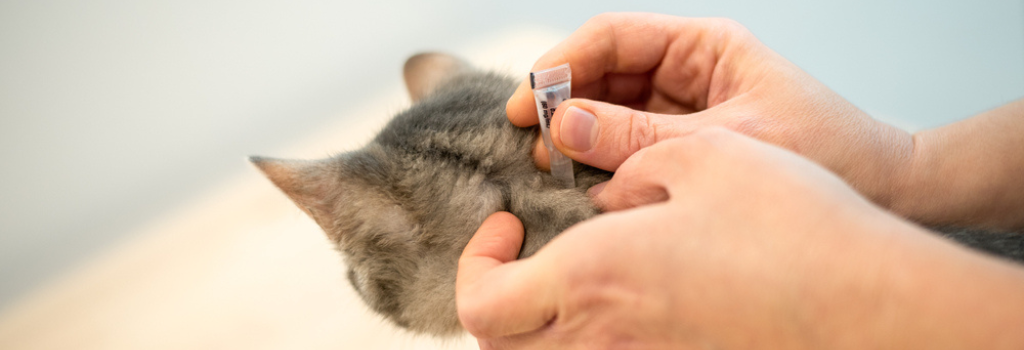Stop the Itch: What You Need to Know About Fleas
We’ve all been there—your cat starts scratching more than usual, and you wonder if it’s allergies or something worse. Most of the time, its fleas. And in South Louisiana, where the climate favors them year-round, prevention is absolutely key.
Maybe you missed a dose of flea prevention, or you’ve spotted what looks like flea dirt. Either way, don’t stress—we’re here to help. We’ve answered the most common questions we get from cat owners to help you get ahead of the itch and protect your pet.
How Do Cats Get Fleas?
Fleas can hitch a ride from almost anywhere—even if your cat is indoors. Once a flea finds its way onto your cat, it doesn’t take long for things to escalate if your pet isn’t protected. We also occasionally see ticks, especially in cats that explore grassy areas, wooded spots, or fields. While less common than fleas, it’s always good to stay aware—especially if your cat loves the outdoors.

Can Fleas Spread to My Home and Family?
Yes, they can. Only a small percentage of fleas live on your cat. The majority are hiding in your home—carpets, bedding, furniture, and more. Fleas multiply fast, and once they’re in, it can be tough to clear them out without proper treatment. That’s why consistent prevention is so important.
But My Cat Is Mostly Indoors—Do They Still Need Prevention?
Absolutely. Fleas can also be carried in on people, other pets, or found on porches and decks. We’ve treated plenty of indoor cats here with flea infestations. Staying on prevention is the best way to avoid the stress of treating your pet—and your home.
What Health Issues Can Fleas Cause?
Fleas are more than just annoying. They can cause intense itching, skin infections, and allergic reactions. If your cat swallows a flea while grooming, it can also lead to a tapeworm infection. In more severe cases, especially in kittens, heavy infestations can lead to anemia due to blood loss. Keeping your pet flea-free is essential to their comfort and health.
What Flea Preventives Do You Recommend?
At Whittington Veterinary Clinic, we offer safe, vet-approved preventives:
Bravecto Plus for Cats: A long-lasting topical treatment that protects your cat for up to 2 months with just one dose. Protects Against:
- Fleas – Kills adult fleas and prevents infestations
- Ticks – Kills black-legged, American dog, and Asian longhorned ticks
- Heartworms – Prevents heartworm disease
- Roundworms & Hookworms – Treats and controls intestinal parasites
Key Points:
- One dose lasts up to 2 months
- Easy to apply at the base of the skull
- Safe for cats 6 months and older (over 2.6 lbs)
- Great for cat owners who prefer fewer applications
Revolution Plus for Cats: A monthly topical that offers broad-spectrum protection against internal and external parasites. Protects Against:
- Fleas – Kills adult fleas and prevents infestations
- Ticks – Kills black-legged, Gulf Coast, and American dog ticks
- Heartworms – Prevents heartworm disease
- Roundworms & Hookworms – Treats and controls intestinal parasites
- Ear Mites – Treats and controls infestations
Key Points:
- Applied every 30 days
- Safe for cats 8 weeks and older (over 2.8 lbs)
- Fast-acting, waterproof formula
- Ideal for outdoor cats or homes with multiple pets
Save Time and Money with Our Online Pharmacy
Whittington Veterinary Clinic offers a trusted online pharmacy that makes caring for your pet even easier.
- Competitive pricing to help you save
- Auto-ship options delivered right to your door
- Faster prescription approvals—we manage everything directly
- Guaranteed, vet-approved products for safety and peace of mind
Why Choose Veterinary Flea Prevention Over Store-Bought?
The preventives we carry are FDA-approved, proven to work, and far less likely to have issues with resistance. Over-the-counter products can be ineffective, and some may not be safe. When you get flea prevention through us, we know exactly what your pet is taking—and we’re here to guide you every step of the way.
How Do I Know If My Cat Has Fleas?
You might see fleas crawling through your cat’s coat—but more often, you’ll see “flea dirt,” which looks like black pepper flakes. A simple test: wipe it with a damp paper towel. If it turns red, it’s flea waste, and your cat likely has fleas.
What Should I Do If I Spot Fleas?
Call us at (337) 893-8522. The sooner we start treatment, the better. We’ll help you get your cat relief fast and recommend the best prevention going forward to stop it from happening again.
